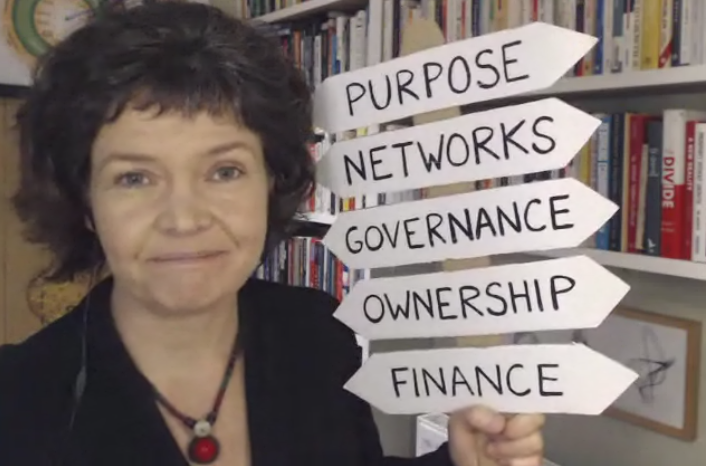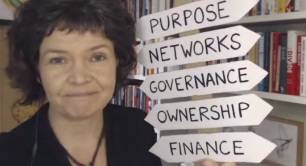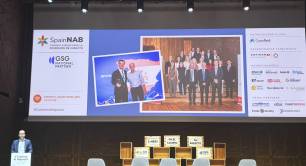The Impact World this Week: 3 October 2025
Your quick guide to the most interesting news snippets about social enterprise, impact investment and mission-driven business around the world from the Pioneers Post team. This week: Nature calls for Doughnut Economics; UK government launches £175m Community Wealth Fund; and Spain’s impact washing clean up.

Global: Nature calls for Doughnut Economics, as the leading science journal published an updated version of the economic framework this week.
Doughnut economics is a framework based on two concentric rings (which comprise the doughnut): an inner ring of social indicators and an outer ring of ecological indicators. If social indicators fall in the ring, human needs and rights aren’t being met; if environmental indicators offshoot the ring, the economy is over-consuming planetary resources. The peer-reviewed paper includes a revised set of 35 indicators that monitor trends in social deprivation and ecological overshoot over the 2000-2022 period. This edition shows that while the global economy has doubled in GDP terms over the last two decades, many global social inequalities are reducing disproportionately slowly and many ecological crises have gone even further into overshoot.
UK: The government has announced the launch of the £175m Community Wealth Fund, which will provide deprived communities with long-term funding to spend as they wish. It will be funded by £87.5m of dormant assets, with the National Lottery Community Fund matching the investment. Community wealth funds were announced in 2023 as one of the four “good causes” to benefit from a second tranche of dormant assets, alongside youth, social investment and financial inclusion. The creation of the Community Wealth Fund by the Labour government follows a consultation with stakeholders on how to structure the funding. The announcement comes as the government launched its ‘Pride in Place’ programme aimed at giving local communities more power over their local areas, which also includes a £150m Pride in Place Impact Fund, distributed to a number of deprived local authorities to invest in projects that benefit their communities.
Spain: A push to clean impact washing out of Spain has been launched by the Spain National Advisory Board on Impact Investment (SpainNAB). Its new Code of Good Practices for Impact Investing is designed to be a tool to strengthen the integrity, transparency and consistency of the sector, as well as to prevent impact washing. The voluntary code is based on what SpainNAB has defined as three characteristics of impact investing: intentionality; impact measurement and management; and additionality. Twenty organisations and products have already signed up to the code.
UK: New-start co‑operatives are more than twice as likely to survive beyond five years as other UK businesses, according to recent data. The 2025 Co-operative and Mutual Economy Report, published by Co-operatives UK, shows co-operatives have an 82% survival rate after five years compared with 39% for companies more widely. The report found the UK’s 10,119 co-operatives and mutuals generated a turnover of £179.2bn in the year to January 2025. This represents a 5.5% income increase year-on-year alongside a 6.5% boost in total number of businesses. However, the annual income of just co-operatives was £42.7bn, remaining broadly flat since 2024.
- Business school: What is a cooperative?
Asia Pacific: A new initiative will enable small businesses in the region to adapt to and make the best use of AI. The AI for MSME Advancement in ASEAN programme, led by ASEAN Foundation in partnership with AVPN, is a two-year initiative that aims to reach 100,000 MSMEs in Southeast Asia with practical and localised AI training, to help them use AI tools to improve their operations, grow their markets and build resilience. Alongside the training, the initiative will also include working with policymakers to build supportive environments for small businesses to thrive in the AI age. The programme is funded through the AI Opportunity Fund: Asia Pacific, an AVPN initiative with support from Google.org and the Asian Development Bank, and the nine local delivery partners for the programme were announced this week.
Global: Large, unrestricted funding (US$100,000 and more) has the greatest effect on investee growth and confidence, regardless of timeframe. That’s the findings of the nonprofit the Global Fund for Children’s newly published Global Impact Study. The report found that large amounts of funding, combined with longer funding periods, enhanced long-term sustainability and greater capacity to foster community-led systemic change. The study conducted 243 interviews and gathered 134 research outputs from staff, community members, children, and young people affiliated with 49 Global Fund for Children partner organisations worldwide. The research used Peer Participatory Action Research methodology, training 31 researchers from partner organisations in Guatemala, India, Kenya and the UK to conduct fieldwork about peer organisations in their countries. The project was fully funded by a MacKenzie Scott grant.
Movers and Shakers
- Big Issue Impact, the advisory service created by Big Issue Group in 2024 to help corporates measure their impact, has appointed Sasha Afanasieva as its new managing director. She was previously chief strategy officer at Big Issue Invest, and replaces Klara Kozlov.
- The founding chair of affordable finance provider Fair for You, Tom Levitt, is stepping down after 10 years on its board. Fair for You is owned by the Fair Credit Charity, which oversees the work of the lending subsidiary. The Fair Credit Charity will now be chaired by Jonathan Moore, former chief executive and board member of two different credit unions.
Top image: Kate Raworth
| Ready to invest in independent, solutions-based journalism?
Our paying members get unrestricted access to all our content, while helping to sustain our journalism. Plus, we’re an independently owned social enterprise, so joining our mission means you’re investing in the social economy. |




